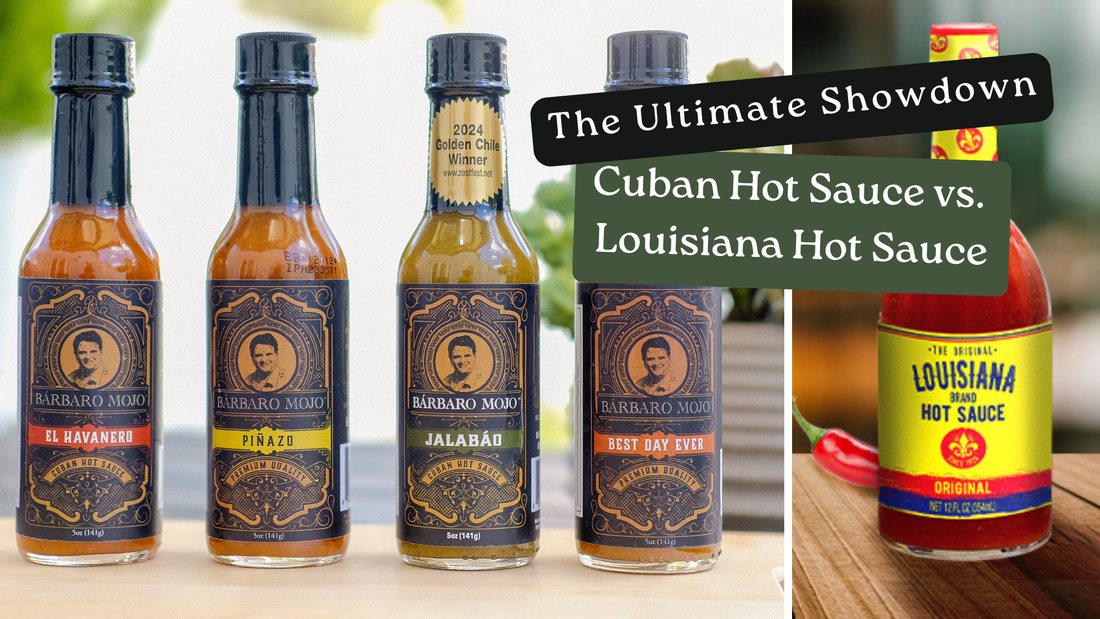
The Showdown: Cuban Hot Sauce vs. Louisiana Hot Sauce
Mario CruzShare
When it comes to adding a kick to your meals, hot sauces are a go-to option for many. Two popular contenders in the world of fiery condiments are Cuban hot sauce and Louisiana hot sauce. While both bring the heat, they each have distinct characteristics that set them apart. Let's dive into what makes Cuban hot sauce unique and how it differs from the classic Louisiana hot sauce.
Flavor Profile
Cuban hot sauce is known for its complex, tangy flavor that goes beyond mere heat. It often incorporates a blend of tropical fruits like mango or pineapple, giving it a sweet undertone that balances the spice. In contrast, Louisiana hot sauce typically has a more straightforward, vinegar-forward taste with a pepper-based heat.
Key Ingredients
The base of Cuban hot sauce usually includes habanero or scotch bonnet peppers, which provide a fruity heat. These are often combined with garlic, onions, and sometimes rum for an extra layer of flavor. Louisiana hot sauce, on the other hand, relies heavily on tabasco or cayenne peppers, vinegar, and salt.
Popular Hot Sauce Brands
For Cuban hot sauce, try Barbaro Mojo. When it comes to Louisiana-style hot sauces, popular options include Louisiana hot sauce, Tabasco Original Red Sauce, and Crystal Hot Sauce.
Heat Level
While both can pack a punch, Cuban hot sauces tend to be hotter on average. The use of habaneros in Cuban recipes can result in a more intense heat compared to the moderate burn of most Louisiana hot sauce varieties. However, Louisiana hot sauce brands often offer varying heat levels to cater to different preferences.
Culinary Uses
Cuban hot sauce shines in marinades, dips, and as a table condiment for meats and seafood. Its complex flavor profile makes it an excellent ingredient in Cuban-inspired dishes. Louisiana hot sauce is incredibly versatile, used in everything from Cajun and Creole cuisine to everyday meals like eggs, pizza, and sandwiches.
Consistency
Cuban hot sauces often have a thicker consistency due to the inclusion of vegetables, fruit pulp and additional spices. Louisiana hot sauce is typically thinner and more liquid.
Cultural Significance
Both sauces are deeply rooted in their respective culinary traditions. Cuban hot sauce reflects the island's tropical influences and Spanish heritage. Louisiana hot sauce is an integral part of Southern U.S. cuisine, particularly in Cajun and Creole cooking.
Recipes to Try
Cuban Mojo Chicken
Ingredients:
- 4 chicken breasts
- 1/4 cup orange juice
- 2 tbsp lime juice
- 2 tbsp El Havanero Cuban hot sauce
- 4 cloves garlic, minced
- 1 tsp oregano
- Salt and pepper to taste
Instructions: Mix all ingredients except chicken to create a marinade. Marinate chicken for 2 hours, then grill until cooked through.
Louisiana-Style Shrimp
Ingredients:
- 1 lb large shrimp, peeled and deveined
- 2 tbsp butter
- 2 tbsp Louisiana hot sauce
- 1 tsp Cajun seasoning
- 2 cloves garlic, minced
- Lemon wedges for serving
Instructions: Melt butter in a skillet, add garlic and Cajun seasoning. Add shrimp and cook until pink. Toss with hot sauce and serve with lemon wedges.
While Louisiana hot sauce has become a staple in many American households, Cuban hot sauce offers a unique alternative for those looking to expand their spicy horizons. Whether you prefer the straightforward heat of Louisiana hot sauce or the complex flavors of Cuban varieties, both have their place in the world of fiery condiments.
Next time you're looking to spice up your meal, why not try Barbaro Mojo's Cuban Hot Sauce? You might find that Cuban hot sauce offers a new dimension of flavor that compliments your favorite dishes in unexpected ways.